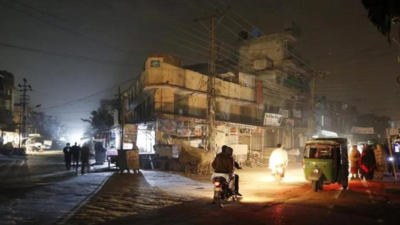Top Searches
- News
- World News
- Pakistan News
- Pakistan economic crisis: Markets, restaurants and wedding halls to close early; government staff told to work from home
Pakistan economic crisis: Markets, restaurants and wedding halls to close early; government staff told to work from home

NEW DELHI: Faced with a crippling fund crunch, Pakistan on Tuesday introduced a slew of measures to cut down on energy costs and decrease dependence on imported oil, including shutting down markets and wedding halls early, and asking government employees to work from home.
Pakistan's cabinet passed the National Energy Conservation Plan a day after the National Security Committee agreed that the revival of the economy is essential for national security.
No lights in cabinet meeting
Pakistan defence minister Khawaja Asif, who made the announcement during a press conference flanked by other cabinet ministers, said the plan to save energy "is being enforced immediately".
“The country is passing through a critical situation. The nation cannot afford to sustain the current levels of power consumption," he said, adding: "All government buildings and offices will also reduce use of energy under the plan, and a policy to work from home will be completed in 10 days."
"No lights were on in the cabinet meeting today. The meeting was held in full sunlight," he said, providing an example for the country to follow.
Measures to cut energy costs
Earlier this year, Pakistan’s government had introduced rolling blackouts and increased power costs because it could no longer secure enough fuel. The move followed other South Asian nations, including Bangladesh and Sri Lanka that announced such steps as part of energy austerity measures.
The Pakistan government estimates the latest austerity steps will reduce power demand by about 9,000 megawatts per day or about half of the current consumption.
Will Pakistan default?
The energy austerity plan comes on the heels of several organisations warning that Pakistan was dangerously close to default.
Pakistan's economic situation is facing "severe headwinds" with inflation being forecast to stay high between 21%-23% (compared to 9.81% in the same period last fiscal) and the country's fiscal deficit widening by more than 115% in the first four months (July-October) of the current fiscal year.
In its monthly economic update and outlook, Pakistan's ministry of finance said last week that economic growth is likely to remain below the budgeted target in FY23 due to devastation caused by recent floods that killed over 1,700 people, inundated a third of the nation and cut the nation’s growth by half.
Low growth, high inflation, dwindling foreign exchange reserves
According to the economic outlook, Pakistan's overall fiscal deficit stood at 1.5% of GDP during July-October 2022-23 as compared to 0.9% of GDP last year.
The Dawn report said the fiscal deterioration was due to higher expenditure growth on the back of higher markup payments while the government is facing the challenge of providing relief to people in flood-hit areas. The climate catastrophe left about $32 billion in damages and losses to the nation’s economy.
Climate change minister Sherry Rehman, who accompanied Asif at the press conference, said the energy-saving plan would also help to tackle climate change issue. "The world has been following this plan for a while and it is imperative for us to change our habits," she said and asked businesses to cooperate.
"A combination of low growth, high inflation, and low levels of official foreign exchange reserves are the key challenges for policymakers," said the alert issued by the Pakistan finance ministry.
Pakistan's foreign exchange reserves have dwindled to about $6.7 billion, equivalent to just over one month of imports.
Pakistan’s economic crisis deepened after the International Monetary Fund delayed its latest loan installments amid disputes over tax targets. It has also sought details on how much the nation will be spending to pay for reconstruction and rehabilitation after unprecedented floods this summer.
On Sunday, former finance minister Miftah Ismail had said: "If Pakistan does default, God forbid - which, I believe can be avoided - it would take six months at the minimum to recover."
(With inputs from agencies)
Pakistan's cabinet passed the National Energy Conservation Plan a day after the National Security Committee agreed that the revival of the economy is essential for national security.
No lights in cabinet meeting
Pakistan defence minister Khawaja Asif, who made the announcement during a press conference flanked by other cabinet ministers, said the plan to save energy "is being enforced immediately".
“The country is passing through a critical situation. The nation cannot afford to sustain the current levels of power consumption," he said, adding: "All government buildings and offices will also reduce use of energy under the plan, and a policy to work from home will be completed in 10 days."
"No lights were on in the cabinet meeting today. The meeting was held in full sunlight," he said, providing an example for the country to follow.
Measures to cut energy costs
- Markets will close at 8.30pm while wedding halls and restaurant would shut doors by 10.00pm. "This will save us PKR 60 billion," said Asif.
- Manufacturing of incandescent bulbs will be stopped from February 1, while production of inefficient fans will be stopped from July. Asif said these measures would help save another PKR 22 billion.
- The government will make the use of conical geysers mandatory within a year, which by using less gas would save PKR 92 billion.
- Alternative use of street lights would save another PKR 4 billion.
- The government also plans to conserve 30% of the electricity used by government departments, which would save PKR 62 billion.
- Electric motorcycles will be introduced by the end of this year to reduce dependence on imported oil.
Earlier this year, Pakistan’s government had introduced rolling blackouts and increased power costs because it could no longer secure enough fuel. The move followed other South Asian nations, including Bangladesh and Sri Lanka that announced such steps as part of energy austerity measures.
The Pakistan government estimates the latest austerity steps will reduce power demand by about 9,000 megawatts per day or about half of the current consumption.
Will Pakistan default?
The energy austerity plan comes on the heels of several organisations warning that Pakistan was dangerously close to default.
Pakistan's economic situation is facing "severe headwinds" with inflation being forecast to stay high between 21%-23% (compared to 9.81% in the same period last fiscal) and the country's fiscal deficit widening by more than 115% in the first four months (July-October) of the current fiscal year.
In its monthly economic update and outlook, Pakistan's ministry of finance said last week that economic growth is likely to remain below the budgeted target in FY23 due to devastation caused by recent floods that killed over 1,700 people, inundated a third of the nation and cut the nation’s growth by half.
Low growth, high inflation, dwindling foreign exchange reserves
According to the economic outlook, Pakistan's overall fiscal deficit stood at 1.5% of GDP during July-October 2022-23 as compared to 0.9% of GDP last year.
The Dawn report said the fiscal deterioration was due to higher expenditure growth on the back of higher markup payments while the government is facing the challenge of providing relief to people in flood-hit areas. The climate catastrophe left about $32 billion in damages and losses to the nation’s economy.
Climate change minister Sherry Rehman, who accompanied Asif at the press conference, said the energy-saving plan would also help to tackle climate change issue. "The world has been following this plan for a while and it is imperative for us to change our habits," she said and asked businesses to cooperate.
"A combination of low growth, high inflation, and low levels of official foreign exchange reserves are the key challenges for policymakers," said the alert issued by the Pakistan finance ministry.
Pakistan's foreign exchange reserves have dwindled to about $6.7 billion, equivalent to just over one month of imports.
Pakistan’s economic crisis deepened after the International Monetary Fund delayed its latest loan installments amid disputes over tax targets. It has also sought details on how much the nation will be spending to pay for reconstruction and rehabilitation after unprecedented floods this summer.
On Sunday, former finance minister Miftah Ismail had said: "If Pakistan does default, God forbid - which, I believe can be avoided - it would take six months at the minimum to recover."
(With inputs from agencies)
Start a Conversation
FOLLOW US ON SOCIAL MEDIA
FacebookTwitterInstagramKOO APPYOUTUBE









